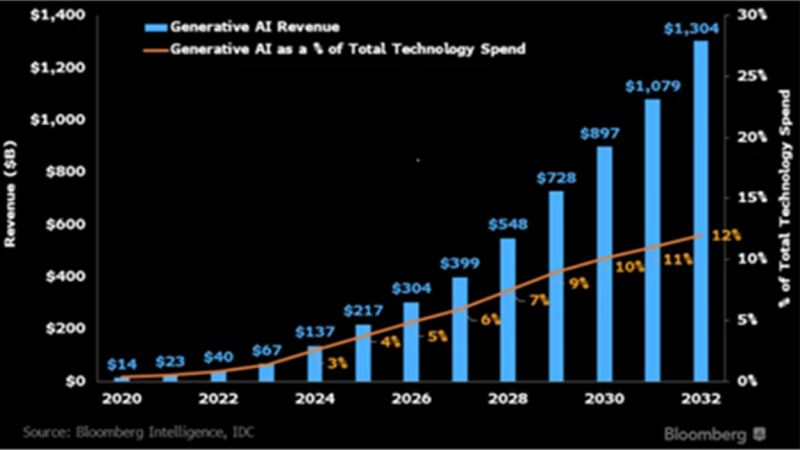Generative AI: Powering Infinite Creation
Date:February 29, 2024

Date:February 29, 2024
Introduction
Generative AI, a next generation technology that is transforming various industries and applications. It refers to a class of deep learning models capable of generating new content, such as images, text, audio, and more, based on knowledge gained from existing data. This technology holds immense potential to drive innovation, creativity, and efficiency in businesses across multiple sectors, the landscape is ripe with opportunities for innovation and investment.
Continuous advancement in the areas of deep learning architectures and computing power is driving the development of more powerful generative models. The surge in cloud computing solutions has propelled the generative AI market expansion by offering a strong ground for technology development and deployment, enabling access to resource-intensive Generative AI model training for businesses with minimal capital investment
By embracing generative AI with a thoughtful approach, companies can unlock new opportunities and stay at the forefront of technological advancements in their respective industries. Businesses are leveraging these technologies to streamline their operations and enhance their products and services.
To name a few benefits of generative AI,
- Improve Customer experience
- Content generation
- Client services
- Personalization
- Efficiency
- Generate new designs/ products
- Knowledge management
Market Study
Generative AI market is poised to explode, growing to $1.3 trillion over the next 10 years from a market size of just $40 billion in 2022, growth could expand at a CAGR of 42%. USA & China are poised to be the top nations in terms of market size, estimated to be valued at 100 bn USD

Some of the key players in the market are Open AI, Google LLC, Microsoft, Meta, IBM, Adobe, Amazon Web services, Nvidia, Synthesis AI…
Challenges
Even though Generative AI models have demonstrated impressive capabilities, from generating natural language text to assisting in various tasks across industries, they introduce significant challenges and risks. Generative AI models are data-driven, which means they inherit biases and inaccuracies present in their training data which can lead to unintentional generation of biased or misleading content. Ethical considerations, including issues like misinformation, privacy breaches, and misuse for malicious purposes loom large. Striking a balance between harnessing the potential of generative AI while addressing these ethical and societal concerns is of paramount importance.
Risks associated with Generative AI
Lack of transparency: Generative AI models are unpredictable, and does not provide any attributions for the content being generated
Fake contents: Generative AI technology can be exploited to create fake and deceptive contents
Data Leakage: Many companies have forbidden employees from entering confidential information in ChatGPT because of data privacy concerns
Accuracy: Generative AI systems sometimes produce inaccurate and fabricated answers. Outputs needs to be assessed for accuracy, appropriateness.
Bias: Outputs from generative AI can inherit biases present in training data leading to generation of biased content.
Intellectual property (IP) and copyright: Content creation through generative AI can pose challenges regarding intellectual property and copyright, since it is difficult to determine who owns the generated content and what rights are associated with it.
Cybersecurity and fraud: Generative AI can be used for creating phishing emails or malwares that is difficult to detect.
Regulatory challenges: Generative AI technology is evolving rapidly and to have a legal and regulatory framework is challenging
Conclusion
Generative AI offers boundless opportunities and challenges being the forefront of technological innovation. With the remarkable ability to create content, generate ideas, and facilitate automation, it has found applications across diverse sectors.
Generative AI has emerged as a driving force of change, optimizing operations, streamlining processes, fostering innovation, and unveiling new opportunities. Its journey continues as researchers, developers, and stakeholders work together to navigate the evolving landscape and maximize its positive impact while addressing the challenges ahead.
However, ethical concerns, including biases and the risk of misuse, emphasize the significance of responsible development and application. Ensuring that generative AI aligns with ethical principles and legal regulations is essential to harness its full potential. Striking a balance between creativity and accountability is the key to its successful integration into various fields.
Reference
1. Generative AI to Become a $1.3 Trillion Market by 2032, Research Finds | Press | Bloomberg LP
2. Generative AI: What Is It, Tools, Models, Applications and Use Cases (gartner.com)




